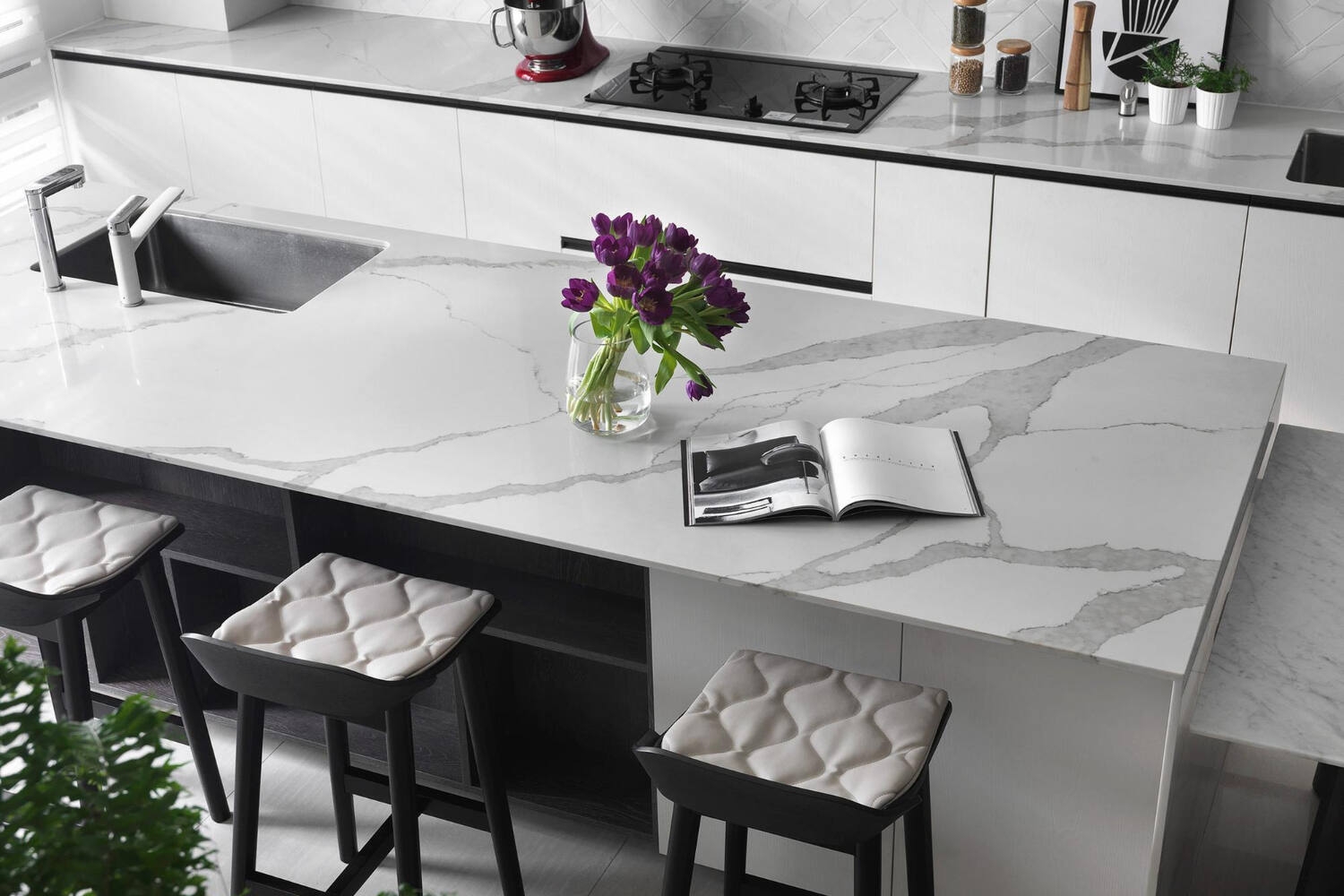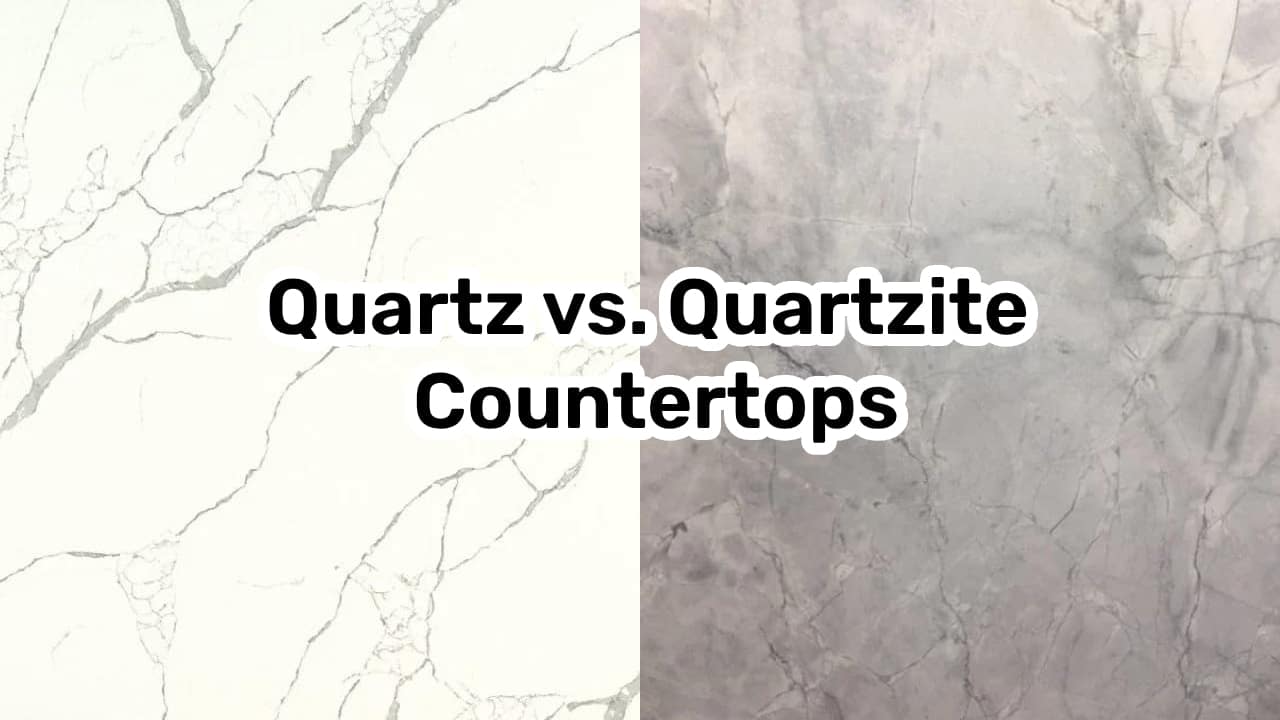The world of countertop materials is varied, but two options that often come into focus are quartz and quartzite. Despite their similar-sounding names, these two surfaces are quite different in composition, appearance, and maintenance requirements.
Today, we will provide a comprehensive guide to unravel the similarities and differences between quartz and quartzite countertops to help you make an informed decision between the two.
Table of Contents
ToggleQuartz Countertops: Engineered Elegance for Modern Kitchens
Quartz countertops have become popular in recent years as they provide many benefits that attract homeowners’ and designers’ attention. Unlike natural stones like marble or granite, quartz countertops are considered engineered stones. However, this human-made material incorporates natural elements. They are created by mixing natural quartz minerals with polymer resins and pigments. Thanks to this manufacturing process, quartz countertops come in a wide range of colors and patterns to suit any kitchen design. In this regard, versatility becomes one of the essential features of quartz countertops.
Moreover, quartz slabs boast consistent coloration and patterning, making finding a perfect match for your interior decor easier. Generally, this uniformity is challenging to achieve with natural stones as each natural stone is unique in appearance.
Another important aspect of quartz countertops is their durability and resistance gained through their manufacturing process, which requires intense heat and pressure.
Quartzite Countertops: The Natural Beauty of Metamorphic Rock
Quartzite countertops are a natural stone surface formed through the metamorphism of sandstone. This naturally occurring metamorphic rock is known for its breathtaking natural beauty and exceptional durability.
First of all, as a natural stone, each quartzite slab showcases the unique minerals present during its formation. Accordingly, no two quartzite slabs are exactly alike, making quartzite countertops an excellent choice for those who are after unique beauty. Besides, the minerals in quartzite result in a stunning array of colors, from milky whites to vibrant blues and earthy tones, adding a distinctive character to each quartzite slab.
Quartzite’s strength and durability are other great features that make it an ideal choice. Known as one of the toughest natural stones, quartzite ensures longevity with its resistance to UV lights, heat, chipping, cracking, and scratches. All these make quartzite countertops suitable even for busy or outdoor kitchens.
Comparing Quartz and Quartzite: Strength, Durability, and Maintenance
Now that we’ve explored some essential qualities of quartz and quartzite let’s dive deeper into a head-to-head comparison of these two popular countertop materials.
Strength and Durability
Quartz is highly durable and resistant to scratches, bacterial growth, and stains. However, quartz countertops are not great at resisting heat because of the pigments and resins they include. Accordingly, not exposing quartz countertops to extreme heat is a requirement to ensure their longevity.
On the other hand, quartzite countertops are incredibly durable and can resist heat and UV lights perfectly. Moreover, quartzite countertops are less prone to chipping and cracking compared to other natural stones. Hence, quartzite countertops can even withstand the rigors of a high-traffic kitchen. However, as a natural material with a porous surface, quartzite countertops require maintenance to be protected from damage, like permanent stains, scratches, and bacterial growth.
Maintenance
One of the greatest things about quartz countertops is that they need minimal maintenance. Thanks to their non-porous nature, quartz countertops do not require sealing, saving you time and energy. Routine cleaning with mild soap and water, along with a soft cloth, will be all you need to preserve the beauty and functionality of your quartz countertops.
Unlike quartz, quartzite has a porous surface, making it susceptible to some kinds of damage, like permanent stains. In this regard, regular sealing is a must to protect quartzite countertops from wear and tear. Along with regular sealing, you should also practice gentle cleaning with nonabrasive cleaners for your quartzite countertops.
Design Versatility: Styling Your Kitchen with Quartz and Quartzite
The choice between quartz and quartzite extends beyond their physical attributes; it also influences your design options and the ambiance of your kitchen. In terms of design versatility, few options can beat quartz countertops because their engineered nature allows them to offer a wide range of colors and patterns. Moreover, quartz countertops can mimic the look of any natural stone. Hence, it is easy to find a quartz countertop that complements your design vision, whether it’s a sleek, modern kitchen or a cozy, traditional one.
Compared to quartz, quartzite has limited color options. However, it has distinctive patterns and color combinations that make each quartzite slab a focal point that enhances the overall aesthetic of a kitchen. Quartzite countertops are especially great for those who are after creating a unique persona in their kitchens.

Pros and Cons of Quartz Countertops: Is It Right for You?
Let’s take a closer look at the advantages and disadvantages of quartz countertops to help you determine if they align with your needs and preferences.
Pros of Quartz Countertops:
- Durability: Quartz countertops are highly resistant to scratches and stains, ensuring they can withstand the demands of a kitchen.
- Design Versatility: With a vast array of colors and patterns, you can easily find a quartz countertop that suits your design style.
- Low Maintenance: Quartz countertops are non-porous and don’t require sealing. Routine cleaning is easy and hassle-free.
- Consistency: Quartz slabs offer a uniform appearance, making it easier to achieve a cohesive look.
Cons of Quartz Countertops:
- Not Entirely Heat Resistant: While they can handle moderate heat, extreme temperature changes can cause permanent damage to the surface.
- Vulnerability to Harsh Chemicals: Quartz countertops can be sensitive to harsh chemicals, so avoiding using them during cleaning is best.
Pros and Cons of Quartzite Countertops: Making an Informed Choice
Quartzite is an incredible material to be utilized as countertops for many reasons, but there are still some considerations to be well aware of.
Pros of Quartzite Countertops:
- Natural Beauty: The unique colors and patterns in quartzite slabs showcase the beauty of nature, adding a distinctive look to your kitchen.
- Strength and Durability: Quartzite is incredibly strong and resistant to heat, UV lights, chipping, and cracking, making it a long-lasting choice.
- Suitable for Outdoor Use: Quartzite can withstand weather conditions, so it is a perfect choice to be utilized in outdoor kitchens.
Cons of Quartzite Countertops:
- Requires Sealing: To protect against stains and damage, quartzite countertops need regular sealing, which adds to their maintenance requirements. While sealing is essential, quartzite can still require more delicate care to maintain its natural beauty over time.
Maintenance Tips: Keeping Your Quartz or Quartzite Countertops Pristine
As it has already become clear for now, proper maintenance is crucial to preserving the beauty and functionality of both quartz and quartzite countertops. Here are some essential maintenance tips to keep in mind for each material:
Regarding routine cleaning for both quartz and quartzite countertops, you should use a soft cloth, mild soap, and water, as well as avoid abrasive cleaners. Moreover, using cutting boars when chopping or slicing is an essential precaution to take for both countertops.
Although they require little maintenance, quartz countertops should still be protected from heat by using trivets or hot pads under hot cookware because they are only resistant to moderate heat.
Last but not least, quartzite’s porous surface makes sealing necessary to prevent damage, like permanent stains, water absorption, and bacterial growth.
Both materials come with significant advantages, making them preferable for different reasons. While quartz primarily offers versatility and low maintenance, quartzite captivates with its durability, resistance, and natural beauty. But at the end of the day, the choice between quartz and quartzite ultimately comes down to your lifestyle, design preferences, and maintenance comfort. Think about your daily practices in your kitchen and determine your requirements to choose between the two.


